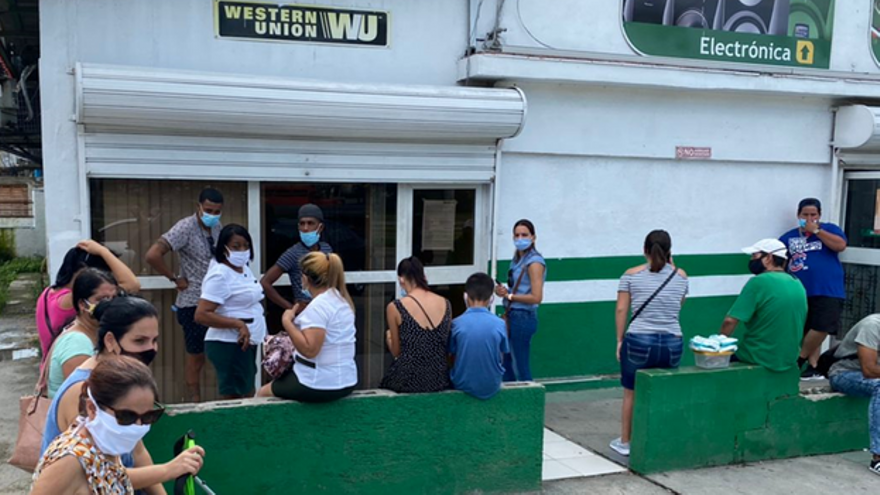
![]() 14ymedio, Havana, January 16, 2024 – Between investing in the private companies promoted by the regime or launching a “great rescue and family reunification operation,” Cuban emigrants have opted for the latter. This is clear from the Cuba Siglo 21 center, based in Madrid, which in its most recent report estimates that in 2023, the diaspora spent between 1.8 and 2.2 billion dollars on the procedures, travel and maintenance costs of the 560,868 Cubans who left the country for the United States, more than 200,000 of them illegally.
14ymedio, Havana, January 16, 2024 – Between investing in the private companies promoted by the regime or launching a “great rescue and family reunification operation,” Cuban emigrants have opted for the latter. This is clear from the Cuba Siglo 21 center, based in Madrid, which in its most recent report estimates that in 2023, the diaspora spent between 1.8 and 2.2 billion dollars on the procedures, travel and maintenance costs of the 560,868 Cubans who left the country for the United States, more than 200,000 of them illegally.
In contrast, remittances experienced a “shocking decline” in the same period: emigrants sent just under 1.973 billion dollars to the Island, the same amount as in 2010. This is a decrease of 3.31% compared to the amount in 2022 – when 2.34 billion dollars were sent – and a scandalous 46% decrease, taking into account the figure of 2019 (3.716 billion dollars). “It is a strong warning sign that the country is losing one of its main sources of income,” says researcher Emilio Morales, author of the report and director of the Havana Consulting Group in Miami.
“Emigration is growing, but remittances are sinking,” Morales summarizes in a formula that was already announced in another of his reports, last October, which commented on the ineffectiveness of the State-run private companies to seduce Cuban-American investors. Without money from abroad, with very little margin of economic freedom and with a spurious task – to provide oxygen to the coffers of the Regime – the destiny of the private companies is to languish until they disappear completely, Cuba Sigla 21 explained at the time.
This massive exodus not only represents the reunification of Cuban families but also the loss of human resources on an unprecedented scale
“This massive exodus not only represents the reunification of Cuban families but also the loss of human resources on a scale unprecedented in the history of Cuba. The lack of confidence in internal policies, the preference for removing family members from the country rather than risking investing in the Island and the rejection of the regime’s abuse have contributed significantly to the decline of remittances,” says Morales.
The news cannot come at a worse time for the regime, the report points out. Inflation brought the value of the dollar in the informal market to 280 pesos, while the official rate remains at 120, and the “monumental desertion” of thousands of professionals – almost all young – has left the country without a workforce.
An “archaic mafia” model, denounced on numerous occasions by Cuba Siglo 21, is the only economic alternative left to the regime for its survival. But, Morales adds, placing their agents, repressors and trusted businessmen as owners of the private companies has been of little use.
“The purpose of overcoming the crisis with migratory therapies did not work on this occasion,” says Morales. The mass exodus – promoted in complicity with the Governments of Nicaragua and Venezuela – was, on the contrary, a “kick in the butt.” Experiencing disaster after disaster, the regime’s “parasitic economic dependence” with respect to exile ended up reaching a dead end.
Online stores for food and basic necessities, as well as private companies, are an “emerging” and unsuccessful strategy, and will not offer financial stability
Online stores for food and basic necessities, as well as private companies, are an “emerging” and unsuccessful strategy that will not offer the financial stability desired by the leadership or end the poverty in the country, says Morales.
The most alarming consequence for Havana of that “disinterest” of emigrants in the Island’s economy now translates into the low volume of remittances, at a time when Latin America enjoys an injection of money from its emigrants. While the continent experienced a 9.5% increase in remittances, Morales notes, commenting on a report from the Inter-American Development Bank (IDB), “Cuba moved in the opposite direction” despite the “facility” offered by the Biden Government to the financial companies Orbit S.A. – “which operates in an opaque way with Gaesa,” the business monopoly of the Cuban Army – and Western Union.
Last November, the IDB published a report on the record number of remittances that arrived in the region in 2023 – about 155 billion dollars – that did not include data about Cuba. However, the Havana Consulting Group reported then that, despite the emigration, the Island was one of the countries that benefited from the money of its emigrants.
The IDB report explains that the highest increase occurred in Central America, with 13.2% more than the previous year, especially to Nicaragua, which grew by an impressive 59% compared to the previous year, most of the money coming from the United States. Last year, 73.5% of remittances to the Caribbean and Central America came from the United States, while Spain appears as the second source in importance, although far behind with only 11.4%.
There was also no data in the report from Venezuela, with 7,000,000 expatriates. The IDB, however, estimates that the amount received was 2.5 billion dollars.
Translated by Regina Anavy
____________
COLLABORATE WITH OUR WORK: The 14ymedio team is committed to practicing serious journalism that reflects Cuba’s reality in all its depth. Thank you for joining us on this long journey. We invite you to continue supporting us by becoming a member of 14ymedio now. Together we can continue transforming journalism in Cuba.
